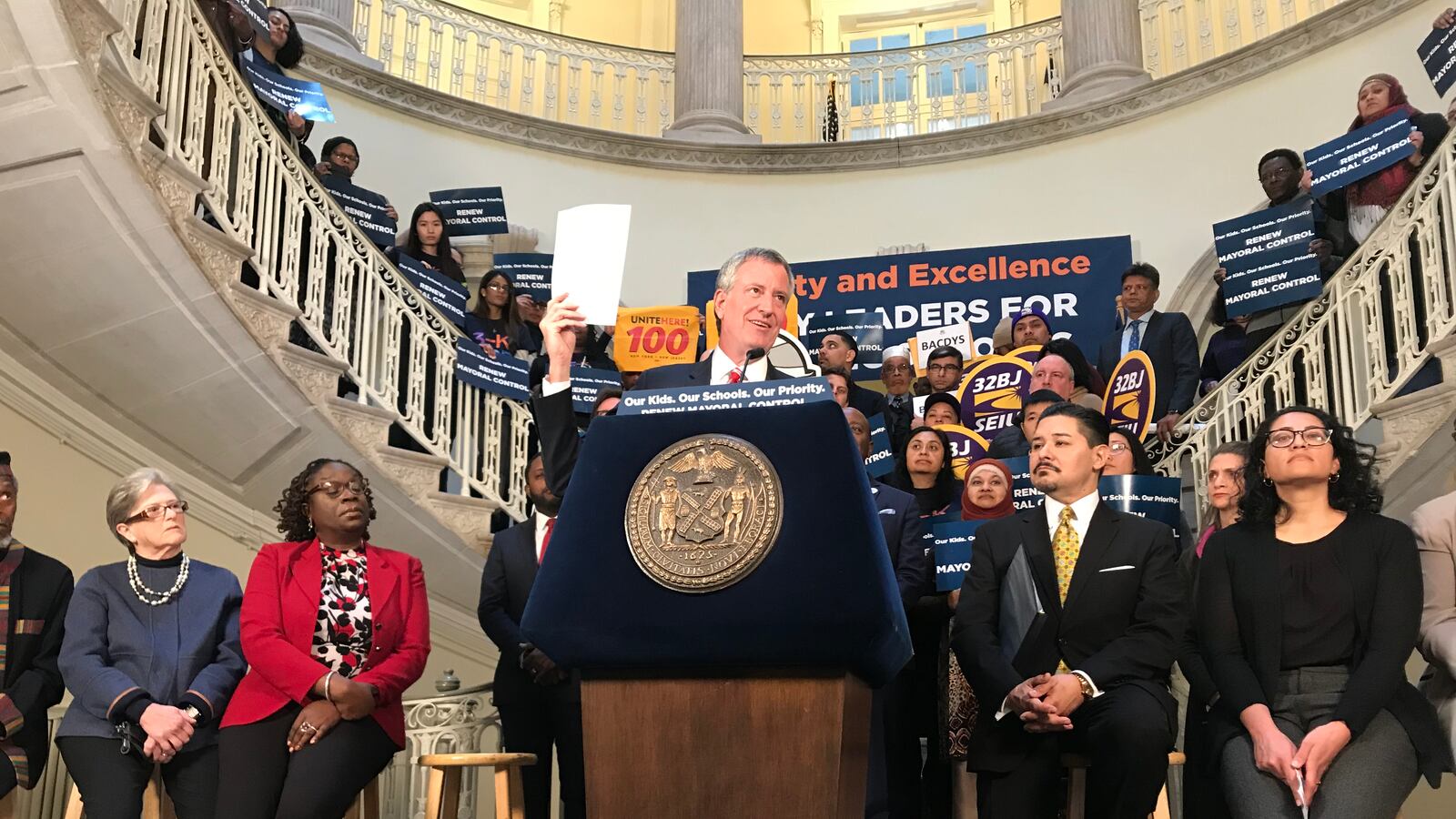In City Hall’s first rally to drum up support for the extension of mayoral control of city schools, Mayor Bill de Blasio acknowledged concerns from state lawmakers that parents need more of a voice in how schools are governed.
The rally came as the debate around mayoral control has begun to heat up. Letters signed by faith, business, and labor leaders were sent to Gov. Andrew Cuomo, Senate Majority Leader Andrea Stewart-Cousins, and Speaker Carl Heastie, urging each to support stretching mayoral control for at least another three years. And on Thursday, the Senate’s Democratic majority called for a hearing in New York City over school governance and mayoral control.
At the rally, de Blasio, Chancellor Richard Carranza, and supporters — including the letter signatories and former Chancellor Dennis Walcott — rattled off changes in city schools since mayoral control was ushered 17 years ago: rising graduation rates, universal pre-K and 3K, growing college enrollment rates, and how mayoral control replaced a school board system that was strained by political battles, which they argued diminished accountability.
“To me, there is nothing more humbling than being responsible for 1.1 million children and their future,” de Blasio said during the rally. “But it is to me a call to arms every day, to get it right, to make sure we continue to make this school system better, to make sure we serve these kids and their parents better.”
With a Democratic majority across state government, there’s no strong desire to dismantle mayoral control or the threat of serious political backlash this year. But state legislators are showing an interest in changing the governance structure under mayoral control for one chief reason: to amplify the voice of the public.
One of those ideas is changing how members are appointed to the Panel for Educational Policy, the governing board for the education department, and decreasing the number of members that the mayor appoints. Right now, the mayor appoints eight of the 13 members, and the panel has been seen largely a rubber stamp for the mayor. Lawmakers have also expressed interest in reforming and strengthening community education councils, where elected parents serve and advocate for their schools.
De Blasio said he’s been “speaking regularly” to Heastie, Stewart-Cousins, and other New York City lawmakers, and despite feeling a growing consensus for a three-year extension, he recognizes there are still concerns about parent involvement that he’s working to address.
“There’s still real concerns about making sure parent voices are heard, and you know, we’re going to take that very seriously until the day the vote is done,” de Blasio said.
Still, De Blasio is resistant to stripping his appointment power to the panel because “if there’s not a mayoral majority on the (Panel), you don’t have mayoral control.”
Anita Gundanna, co-executive director of the Coalition for Asian American Children and Families and one of Thursday’s speakers, said mayoral control means clear leadership that can make tough decisions, and said the department of education has “made strides” in listening to Asian-American families (though many supporters of keeping the specialized high school exam would disagree). But she also called for more change, such as more public briefings on how English language learners and students with disabilities are progressing academically.
“We believe that transparency and community engagement are critical components of mayoral control,” Gundanna said during the rally. “Clear communication lines must exist from community education councils to the Panel for Educational Policy, and on district level decisions that need to be made.”
Mayoral control of schools, established in 2002 under Mayor Michael Bloomberg, is not permanently enshrined in state law, and the expiration date for this latest period of control is June 30. While state legislators granted Bloomberg longer extensions, de Blasio has only been able to secure one to two years of control, seen as retribution from Senate Republicans for the mayor’s efforts to unseat them.
While mayoral control could get discussed before the April 1 deadline for the budget, it could also get pushed back to the 11th hour, as it did in 2017.

